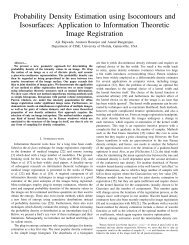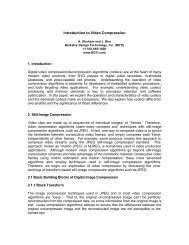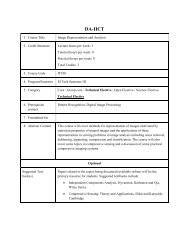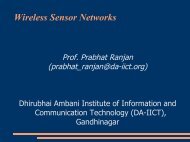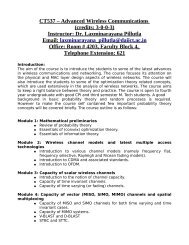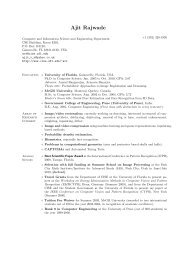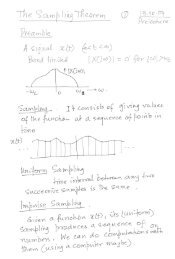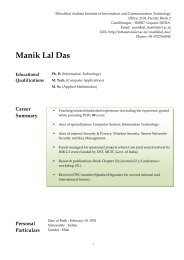View - DAIICT Intranet
View - DAIICT Intranet
View - DAIICT Intranet
Create successful ePaper yourself
Turn your PDF publications into a flip-book with our unique Google optimized e-Paper software.
DA-IICT<br />
Epics & Episteme<br />
Assignment on Mahabharata<br />
Puneet jindal<br />
200501239
Narration and Writing<br />
Vyasa, the celebrated compiler of the Vedas, was the son of the great sage Parasara.<br />
It was he who gave to the world the divine epic of the Mahabharata. Having<br />
conceived the Mahabharata he thought of the means of giving the sacred story to the<br />
world.<br />
It was before the days of printing, when the memory of the learned was the sole<br />
repository of books. Vyasa first taught the great epic to his son, the sage Suka. Later,<br />
he expounded it to many other disciples. Were it not so, the book might have been<br />
lost to future generations.<br />
Janamejaya, the son of the great King Parikshit, conducted a great sacrifice in the<br />
course of which Vaisampayana narrated the story at the request of the former.<br />
Afterwards, this story, as told by Vaisampayana, was recited by Suta in the forest of<br />
Naimisa to an assembly of sages under the lead of the Rishi Saunaka.<br />
Suta addressed the ascetics "I had the good fortune to hear the story of the<br />
Mahabharata composed by Vyasa to teach humanity dharma and the other ends of<br />
life. I should like to narrate it to you."<br />
Suta continued "I heard the main story of the Mahabharata and the episodic tales<br />
contained therein told by Vaisampayana at the sacrifice conducted by King<br />
Janamejaya. Afterwards, I made an extensive pilgrimage to various sacred places and<br />
also visited the battlefield where the great battle described in the epic was fought. I<br />
have now come here to meet you all." He then proceeded to tell the whole story of<br />
the Mahabharata in the grand assembly.<br />
Narrative Structure<br />
The mahabharata's narrative technique matches its complexity and depth of<br />
philosophy. The technique of narration is that of a story within a story. The main<br />
account of the kuru dynasty begins after several small stories. The narration happens<br />
at many levels. Vaismpayana narrates the tale to janmajeya at the snake ceremony.<br />
Another sage who heard the story at the ceremony narrates it to the bhrigu<br />
2
ahmans whom he meets in the naimisha forest. Finally,there is Vyasa, the<br />
overarching narrator, who is telling the tale to lord ganesha, the penman of the<br />
mahabharata. Such an intricate and elaborate narrative structure prepares the<br />
readers for further framings. The narrative structure of the text is so complex<br />
because of the “dialogic relationship among voices” in the Mahabharata. For<br />
instance, the sage brihadasva narrated the story of nala and damyanti to Yudhishtra<br />
in the forest to console him for his loss in the dicing match. It also serves the purpose<br />
of comparing the results of dicing for yuddhishthira and nala. Such narratives are<br />
spread all over the text and they all add to its encyclopaedic quality.<br />
In the current text of the Mahabharata one recognizes two different levels of<br />
narration as regards the main story of the epic. One is the discourse of the<br />
Ugrasravas, which makes up the outermost, larger framework of narration, while this<br />
framework encapsulates the inner one represented by the recital Vyasa original epic<br />
by one of his own pupils named Vaismpayana.<br />
Now we analyze the narrative structure of Mahabharata and get an insight of its<br />
characters from three stories taken from it.<br />
Story-1<br />
It is towards the starting of the Adi parva that Vaismpayana launches his long<br />
recitation. The first chapter of this sub parva opens with a scene of Vyasa paying a<br />
visit to the king Janamejaya, who has already had himself consecrated for the<br />
performance of snake sacrifice. In the presence of priests and kings assembled in the<br />
sacrificial site, Janamejaya first pays due homeage to Vyasa and then express his<br />
earnest wish to learn all the deeds of Kurus and Pandavas, especially about the fierce<br />
battle fought by them. Vyasa himself does not take on the task of relating the grand<br />
story but entrusts to his pupil Vaismpayana who is sitting nearby, ordaining him to<br />
recite the whole epic. Vaismpayana instantly starts his recital of the whole epic which<br />
is known as “itihasnam puratanam”. It is this very recital which holds the whole main<br />
part of the Mahabharata. As for the absence of the Vyasa own narration in the epic,<br />
the reason could be sage direct participation in the main story. During the long recital<br />
by Vaismpayana, king Janamejaya occasionally interpolates some comments or<br />
3
questions. The whole main corpus of the epic was therefore, be regarded as a<br />
dialogue between the king and the disciple of Vyasa.<br />
The first book contains two different introductions to Ugrasravas, each located at a<br />
different place. The narrative of Ugrasravas visit to ascetics in the Naimisa forests,<br />
with which the entire epic starts, is repeated at the beginning of the fourth<br />
subsection, Paulomaparva. Now, this passage is followed by verses in which seers<br />
asked the suta to tell his stories only in presence of their venerable chieftain Saunaka.<br />
On the arrival of latter the suta entered in a long talk with him.<br />
The Astikaparva starts with the Saunaka’s question as to why king Janamejaya<br />
resolved to annihilate all the serpents on earth and how Astika rescued them from<br />
danger of death in sacrificial burning. In response to these question, suta relates the<br />
sequence of events culminating in Janamejaya’s celebration of the snake sacrifice for<br />
the purpose of avenging the death of his father, as well as deeds of Astika, son born<br />
to a brahmin ascetic and a serpent princess, who finally succeeds in stopping the<br />
sacrifice by asking a boon from the king. Suta concludes it with statement that one<br />
who has recited or listened to Akhyana of Astika from its beginning shall nowhere<br />
encounter any danger from snakes.<br />
The text of Astika parva continues for further 10 verses. This text consists of dialogue<br />
between Saunaka and Ugrasrava. In this passage Saunaka first expresses his<br />
satisfaction having learnt the marvelous deeds of Astika and then wishes to hear<br />
Mahabharata from Ugrasrava. To this request Ugrasrava described Saunaka the<br />
circumstances in which Vyasa ordered his disciple Vaismpayana to recite the ancient<br />
Itihasa before king Janamejaya. And narration of Vaismpayana continued till the end<br />
of Mahabharata.<br />
Story-2<br />
The old king Dhritrashtra in the fifteenth year after the great battle retires from royal<br />
life into a forest, accompanied by his own wife, his brother’s wife, the widows of<br />
kaurava princes and passed their last years in fasting and penance till they meet their<br />
4
death. One of the significant events which occur in these years is the reunion of the<br />
old ascetic with his old dead sons, realized through the supernatural power of Vyasa.<br />
This incident is narrated in subsection Putradarshanam parva. Dhritrashtra, Gandhari<br />
and the widows of kaurava princes had never been free from the grief since the<br />
death of their sons and husbands. When Vyasa meets them in the forest they bewail<br />
their bitter fate and appeal to him for support and sympathy. At his instruction they<br />
all approached to the banks of Ganga, and there by his yogic power, he invokes the<br />
spirit of dead princes. Meeting again with each other, both the living and the dead<br />
pass the night in utmost felicity. After the disappearance of the princes at the<br />
daybreak, their widows plunge into the river in order to be reunited with their<br />
husbands forever.<br />
The passage describing the felicitous life in the heavenly abodes with which the<br />
widows are rewarded for their voluntary suicide is immediately followed by verses<br />
which specify the merits one acquires by reciting or listening the story of family<br />
reunion.<br />
“Suta uvach” is devoted to a lengthy philosophical discourse Vaismpayana holds in<br />
response to a question by Janamejaya about the reappearance of dead bodies. In a<br />
subsequent chapter, Suta relates how the king deeply moved by the family reunion,<br />
entreats Vyasa to show him his own father again. The sage realizes the wish of the<br />
king instantly by invoking the spirit of Pariksit.<br />
The shift in narration from Vaismpayana to Ugrasrava is necessitated by the nature of<br />
the content since the incident which occurs simultaneously with Vaismpayana’s<br />
recital at the sacrificial site cannot be narrated by the reciter himself as a past event<br />
and therefore it is being narrated by Ugrasrava.<br />
Story-3<br />
When Yudhishthir had Maya danav build his assembly, he conducted the Rajsooya<br />
Yagya and for the benefit of humankind, gathered scholars and distributed the riches<br />
collected from various kings amongst scholars, Brahmans, intellectuals and the<br />
5
needy. As a reaction to this, the assembly hall that Duryodhan constructed, was<br />
something like a modern casino, where gambling was the only form of<br />
entertainment. There could have been no spiritual discussions, no worship or praying,<br />
and no exchange of higher thoughts and beliefs here. The only sport that could take<br />
place was gambling. Before coming to Hastinapur, there has been an extensive<br />
discussion between Vidur and Yudhishthir in Indraprastha, where Yudhishthir has<br />
opposed gambling in the strongest terms. After reaching Hastinapur, an entire<br />
chapter is dedicated to Yudhishthir’s argument with Shakuni, where Shakuni defends<br />
gambling and Yudhisthira opposes it.<br />
Yudhishtra says “Gambling causes quarrels and brawls. No intelligent person would<br />
like to gamble. Gambling is a form of deception and a cause for sin. One can neither<br />
demonstrate valiance suitable to a Kshatriya, nor are there any set rules for it. I have<br />
no desire to gamble.”<br />
One particular utterance of Yudhishthir is quoted over and over in many discussions.<br />
Where he says, it is wrong to gamble, it causes complete destruction, but if he were<br />
invited, he would not refuse. Yudhishthir was the kind of person who is willing to<br />
endure the biggest tests in order to prove his smallest obligation to dharma. Thus<br />
Yudhishthir sits down to gamble in accordance with respect for Dhritarashtra’s<br />
invitation despite being fully opposed to it in his heart.<br />
In Mahabharata, the word ‘uncle’ has been used nowhere for Dhritarashtra in<br />
Pandava’s context. He has been called pita in the original verses. Yudhishthir’s<br />
dharma was in his truth, and in fulfilling the wishes of elders. Therefore, knowing that<br />
Dhritrashtra could rob him of his life, or knowing that Dhritarashtra wants Duryodhan<br />
to be the ruler of Hastinapur, even if that requires killing the Pandavas, Yudhishthir<br />
does not disobey any of Dhritarashtra’s commands. Yudhishthir seems bound by this<br />
commitment to his dharma during the betting that took place in the gaming hall. He<br />
is constantly opposing gambling, but never refuses to play. As that was<br />
Dhritarashtra’s command.<br />
After Vidur warns Yudhishtra in Indraprastha, he says in clear words, “On command<br />
of King Dhritarashtra, I certainly wish to partake in the games. A father is always dear<br />
to a son.” After arriving in front of Dhritarashtra, he again says, “Sire! You are our<br />
6
lord. Command us what we should do. Bhaarat! We always wish to remain under your<br />
direction.” He is willing to handover the entire kingdom to Dhritarashtra even after<br />
winning the war of Mahabharata, because father is the lord, and a son is under his<br />
command.<br />
Yudhishthir regains his wealth and rule as a boon from Dhritarashtra after having lost<br />
everything once, and Draupadi has been fully humiliated. But Yudhishthir is called<br />
back again, and again he sits down to gamble. The reason for him to gamble a second<br />
time is the same as what it originally was – his father’s and king’s command.<br />
“Jewel amongst Bharat’s descendents and son of Pandu Yudhishthir! Your father King<br />
Dhritarashtra has instructed you to return. Our assembly is once again complete with<br />
its members and is waiting for you. You shall throw the dice and gamble.”<br />
Yudhishthir Said, “All creatures attain auspicious and inauspicious results by the<br />
inspiration of God. No one can evade them. It appears I will have to gamble again.<br />
This invitation to gamble by the command of Old King Dhritarashtra is the cause of<br />
our family’s destruction. Even as I know this, I cannot disobey his order.”<br />
By gambling, he obeyed his father’s command. Why was it then necessary to play till<br />
the end and get up only after total destruction? He could have gotten up at any time.<br />
The answer to this question could be found out by seeing Vidura’s action at that time.<br />
He was the biggest benefactor of the Pandavas. He opposes gambling vigorously. He<br />
appeals to Dhritarashtra repeatedly to stop the game, but not once does he say to<br />
Yudhishthir, “that is enough. Son! Leave the game and get up.” The game has been<br />
started by the king’s command, and only by his command can it be paused or ended.<br />
Without his permission Yudhishthir cannot leave the game, and as he plays, he must<br />
wager something. Knowingly, he loses everything and stops. He has already lost his<br />
brothers and his own self. As he loses himself, Shakuni says to Yudhishthir, “Sire! To<br />
wager yourself and to lose is an act of extreme impiety (adharma). It’s a great sin to<br />
wager yourself while you still possess wealth. Sire! Your dearest Draupadi is such a<br />
hand that you have not yet lost. Thus wager Krishnā and by her, win yourself back.” It<br />
is worth noting that dharma raj Yudhishthir is following his dharma even while<br />
gambling, while vulpine and deceiving Shakuni is accusing him of being improper. As<br />
a response to this Yudhishthir immediately wagered Draupadi and by losing, while<br />
7
protecting his dharma he earned that disgrace that the society has still not been able<br />
to forgive. Every act of dharma raj Yudhishthir is for the protection of dharma.<br />
Dhritarashtra is the only person who could have stopped the game. But he simply<br />
doesn't have the spine to make his own decisions, or stick to them when he does<br />
make them. He puts all of that off onto his son. Rather than guiding his son by being<br />
a moral example, he subtly encourages his son by lack of response to terrible<br />
actions. Dhritarashtra is one of those characters who is so incabable of morality (good<br />
or bad) that he'll put himself as far away from it as possible, by rationalizing or<br />
avoding poor decisions,<br />
The problem was that Vidura was powerless. He can merely advise, exhort, and plead<br />
with the blind Dhritarashtra who, obsessed by his desire that the throne must be his<br />
son Duryodhana’s, is deaf to all appeals. In the very beginning of the epic we are told<br />
that the Kauravas are a giant tree of passion whose root is the weak-minded<br />
Dhritarashtra. Its seed is infatuation; its branches are anger and pride rooted in<br />
ignorance. Or even pretending he doesn't understand it at all.<br />
Bhishma’s failure as a leader of the polity lies in his never having practiced the rajadharma<br />
he speaks of at length to Yudhishthira on his bed-of-arrows which seems to<br />
become his penance for inaction. In a Kshatriya the “witness” stance only brings<br />
about the destruction of the policy. The Kshatriya must use power to protect the<br />
rights of the weak, for that is his dharma, the truth of his nature. To abjure this<br />
because of a self-imposed vow and turn into the “egotistical sublime” of the age<br />
brings destruction and misery in its wake not only for oneself, but also for the entire<br />
society of which such a person is the corner stone, the pillar of strength.<br />
Karna might appear to be nobility and generosity personified, but actually he is eating<br />
his heart out in envy and every act of his is triggered by a sense of deeply injured<br />
merit, a hyper-sensitivity about his low caste, which goes so far as to drive him to bid<br />
a princess to be stripped in public and to term her a prostitute.<br />
The question would be asked "Why did Bhishma, Dronacharya, and Vidura not desert<br />
the evil company of king Dhritarashtra and join the Pandavas?" The answer is given<br />
by Bhishma himself. He had vowed to remain loyal to the throne of Hastinapur<br />
8
irrespective of who occupied it. This pledge was more than anything to him. His life,<br />
non-righteous behavior of Kauravas, and sufferings of Pandavas had no value in face<br />
of his pledge. As to Dronacharya and Vidura, their dharma was to obey the king. To<br />
oppose the king or to find faults with him (or his sons) would be against their dharma.<br />
They have to be with the king’s decision whether he is right or wrong.<br />
The dice game of the Sabha Parvan, this "playful" (yet deadly serious) conflict<br />
between Pandava and Kaurava foreshadows the apocalyptic battle between the two<br />
clans, and the outcome of the game provides the impetus for bringing about that<br />
event. The dice game embodies a seemingly irresolvable conflict that is central not<br />
only to the epic, but to the larger tradition of which it is a part: the conflict between<br />
chaos and order, unpredictable and the certain. If it were a game of ritual and its<br />
objective was to bring social order and harmony between brothers then it the game<br />
would be planned at a sacred place which makes the environment as in a temple. The<br />
Mahabharata's ritual dice game, however, results not in the establishment of social<br />
order, but in their destruction largely because its participants fail to follow the proper<br />
rules. One obvious flaw in the dice game as ritual is that it is wrongly emplaced.<br />
In most versions of sacrifice this kind of game took place in a hut which contained a<br />
throne on which the king was ceremonially installed after taking three "Vishnu steps,<br />
intended to recreate Vishnu's miraculous reclamation of the three worlds. The hut<br />
provided the "focusing lens" for sacrality, marking off the ritual space and the<br />
miniature cosmos which it embodied from the outside. Pandavas' hall has such a<br />
model as Krishna tells the Asura craftsman to "build an assembly hall where we will<br />
see the designs of the Gods laid out and the plans of Asuras and men”. Thus logical<br />
analog to this hut in the world of the epic is the assembly hall built for the Pandavas<br />
by Maya and therefore the most likely location for the dice game. Yet the<br />
Mahabharata's game occurs not in the Pandavas' hall, but in the hall of the Kauravas,<br />
which, though very beautiful, is built specifically for the purpose of gambling and is<br />
not sacralized by the status of a ritual microcosm.<br />
9
The epic's dice game also diverges from the prescribed ritual in the fact of the king's<br />
participation. In the rajasuya's dice game, players were members of four varnas; the<br />
king apparently did not actually participate, aside from being presented with the dice<br />
at the end of the game. Yudhistira himself tells us that gambling is "trickery, an evil"<br />
inwhich "there is no kshatriya prowess." Clearly, Yudhistira, as the sacrificer in the<br />
rajasuya ritual and as a king and kshatriya, should not be participating in the game.<br />
If the king doesn't actually play, the king can not lose, and the prescribed social and<br />
cosmic order will remain intact. Yudhisthira's participation shifts the dice game from<br />
a mode of "generating the expected" to a mode of "generating the unexpected."<br />
Rather than the establishment of the proper social order, his participation results in<br />
its complete reversal. If ritual was properly performed, the world would remain<br />
eternally the same.<br />
Conclusion<br />
From one point of view, Vyasa’s epic is a study of the use and abuse of power. It is<br />
not that in itself power is good or bad. It is essentially a force, a weapon, which can<br />
be used to save and foster or to harm and extort: “Desiring power first as an<br />
instrument for the achievement of other ends, he falls in love with and retains it as an<br />
end in itself.”<br />
Urdhvabahurviraumyesa na ca kashcicchrnoti me |<br />
Dharmadarthashca kamashca sa kimartham na sevyyata ||<br />
“I raise my arms and I shout – but no one listens!<br />
From dharma comes success and pleasure: Why is dharma not practised?”<br />
– Svargarohana Parva<br />
The entire Mahabharata is in fact intimately concerned with issues of play, of which<br />
the dice game is just one example.<br />
What the dice game in the Mahabharata presents us with, then, is the disintegration<br />
of the boundaries between sacrifice and ritual. In the rajasuya ritual texts, a ritualized<br />
10
game is designed to solve a problem created by the ritual, and its predetermined<br />
outcome is executed neatly and safely. The Sabha Parvan's dice game, however,<br />
catapults us into a world of spontaneity, danger, and violence, in which only<br />
destruction is assured. This story does not explicate the issues raised by Draupadi,<br />
but emphasizes the breach of duty by the elders who did not follow the dharma<br />
codes.<br />
The entire Mahabharata is the narration of a sage-poet of boundless wisdom who<br />
was both a participant and a witness to the drama of life that was unfolded through<br />
him and all around him – witness in the spiritual, in the Vedantic sense.<br />
There is no shame in him when he speaks of his own birth. He narrates with complete<br />
dispassion how Sage Parashara saw his mother, a dark, young girl engaged in ferrying<br />
passengers across the Yamuna then, and lusted for her. He would speak with the<br />
same detachment of how he himself could not retain self-control at the sight of the<br />
Apsara Shuki and how his son Shuka was born to her. And then he will proceed to<br />
speak without inhibitions of the lusts of the future generations of his family – of<br />
sexual lusts, of power lusts, of vengeance lusts, of violence lusts.<br />
The narrative technique employed, in a poem with a bewildering number of apparent<br />
narrators, the so-called narratorial voice is largely concealed. There are few<br />
explanations or even lyric elements by which an author might address his audience<br />
directly, telling them how he expects them to respond to his tale. Here, author has<br />
conveyed their meaning from the outside, presenting their story by means of a series<br />
of tableaux, and leaving the audience to interpret the characters’ feelings from their<br />
actions. The hero’s dilemmas are standardly conveyed, not by any internal<br />
deliberations, but by the juxtaposition of opposing arguments. The hero has<br />
remained resolute, but author have indicated the doubts and temptations he has<br />
silently overcome by putting them into the mouths of the lesser characters, a<br />
technique which serves to maintain the hero’s moral stature, or even to increase it.<br />
The backbone of the mahabharata is its dialogues. These dialogues bring out the<br />
various ideologies and view points to a particular situation. Nonetheless, it is not<br />
necessary that they reach a conclusion. To any question of dharma, several answers<br />
11
are given and no answer is adjudged supreme. Everyone answers according to his<br />
dharma and the reader has to choose according to his own dharma. That is why, the<br />
Mahabharata is considered to be a text of debates. The most important function of<br />
the dialogues is that it provides a meditative moment to characters to explore various<br />
moral options available to them for a given situation. Therefore, we can see how<br />
complex is the style, structure and narrative technique of the Mahabharata is.<br />
However its language is so free flowing and rhythmic that the philosophies that are<br />
really hard to understand are made easy to read.<br />
12



